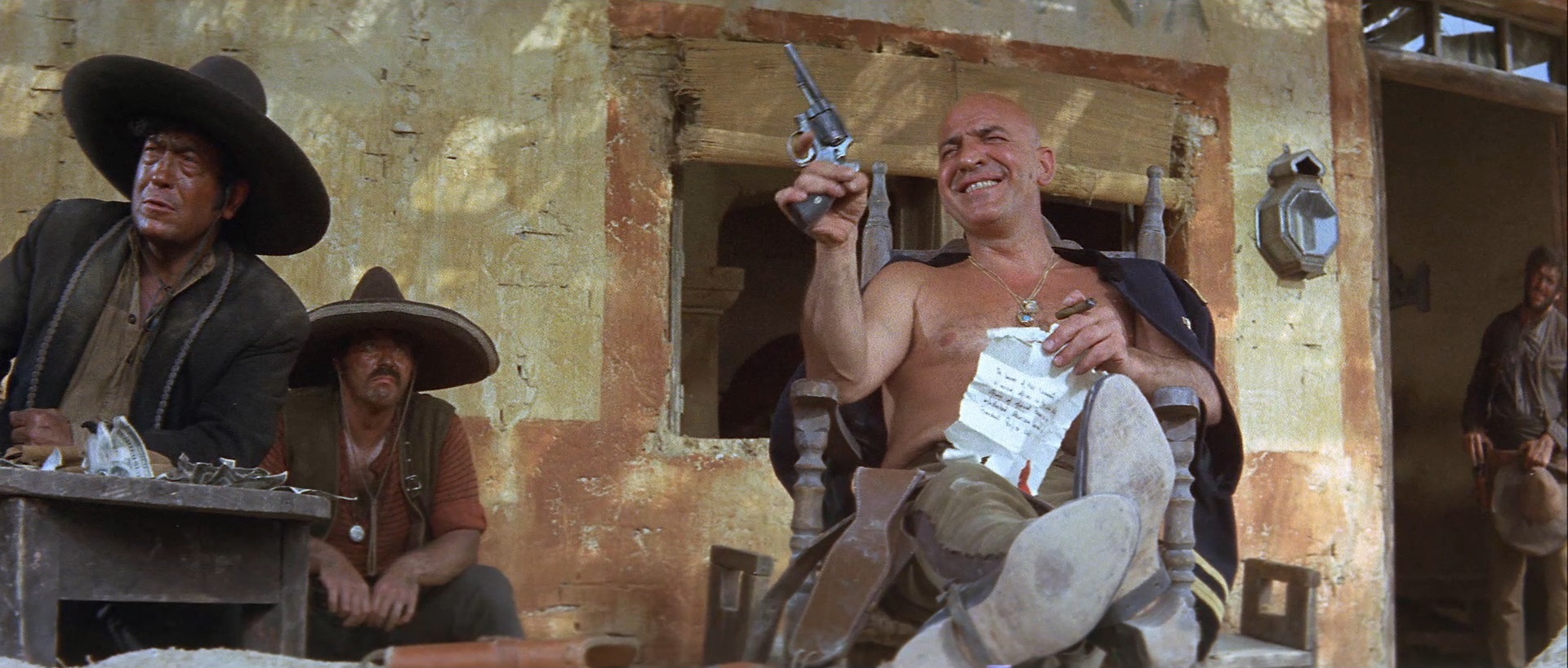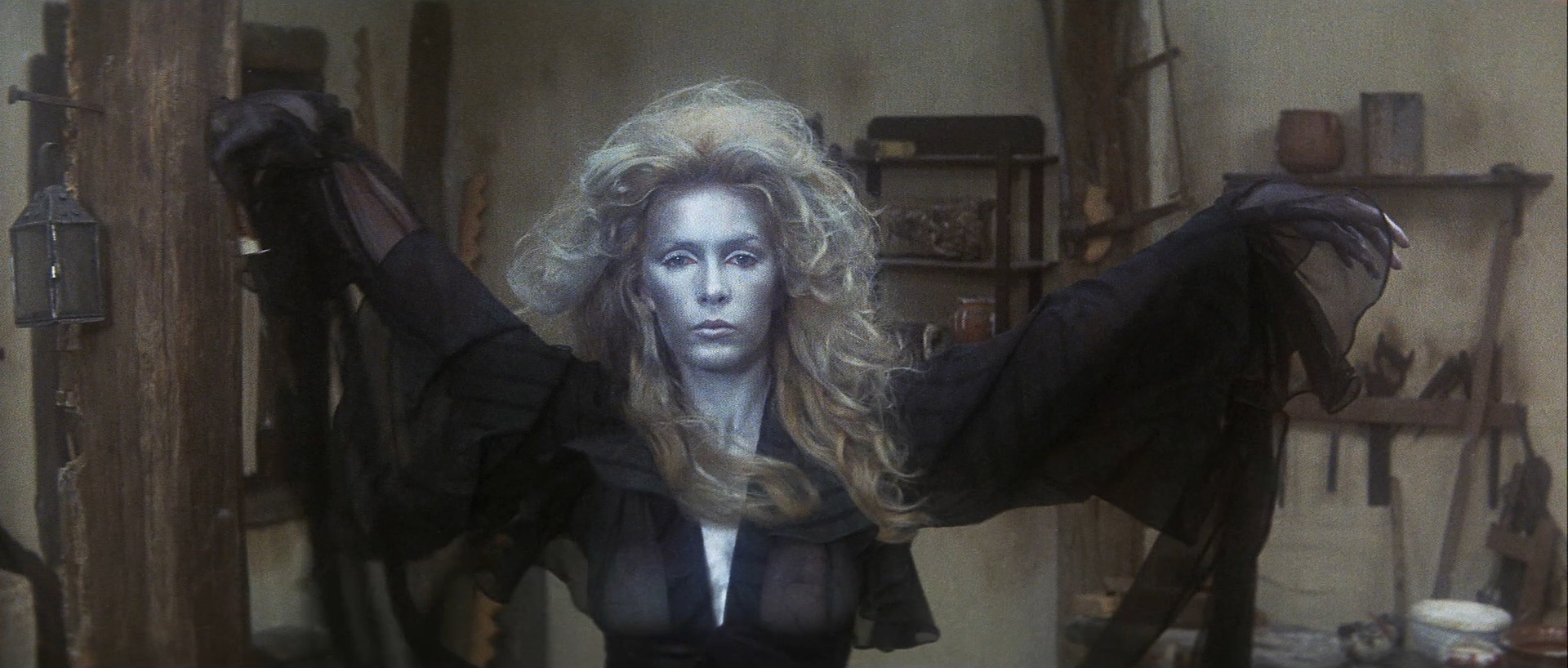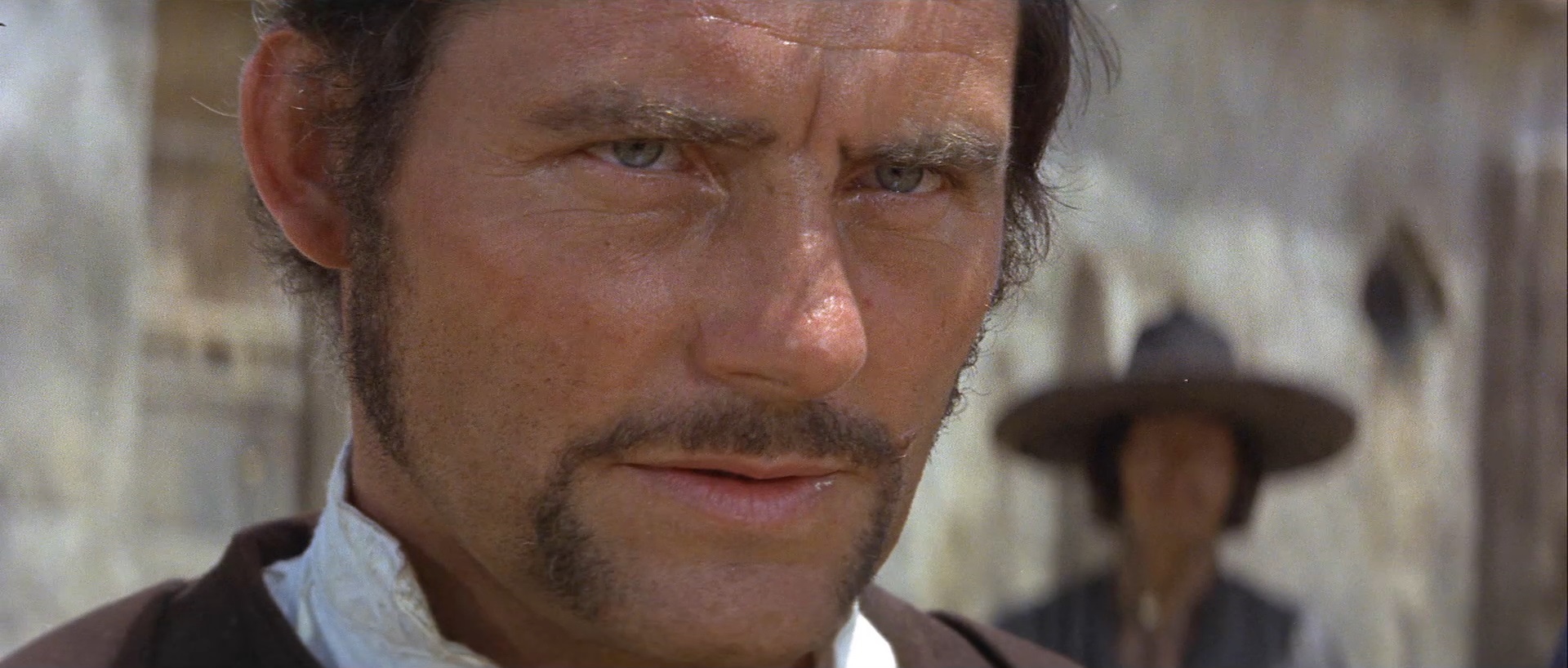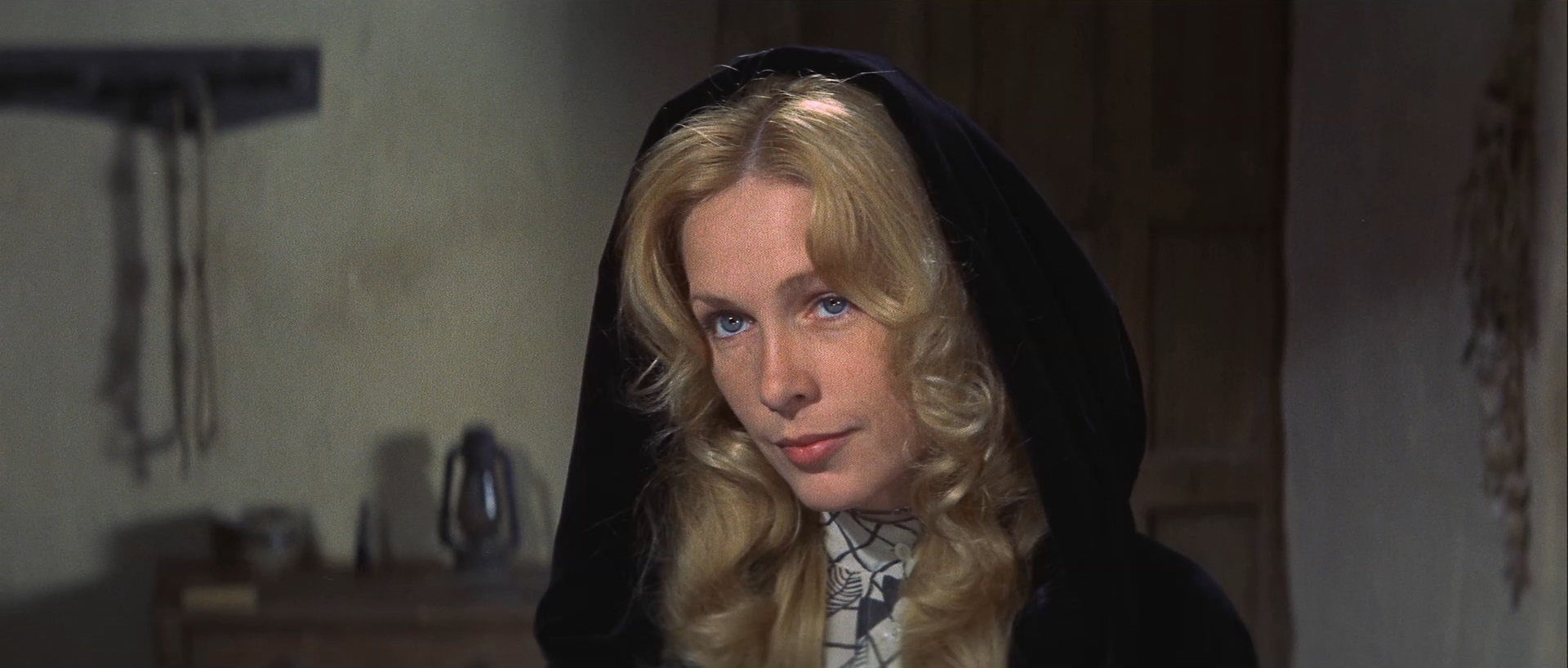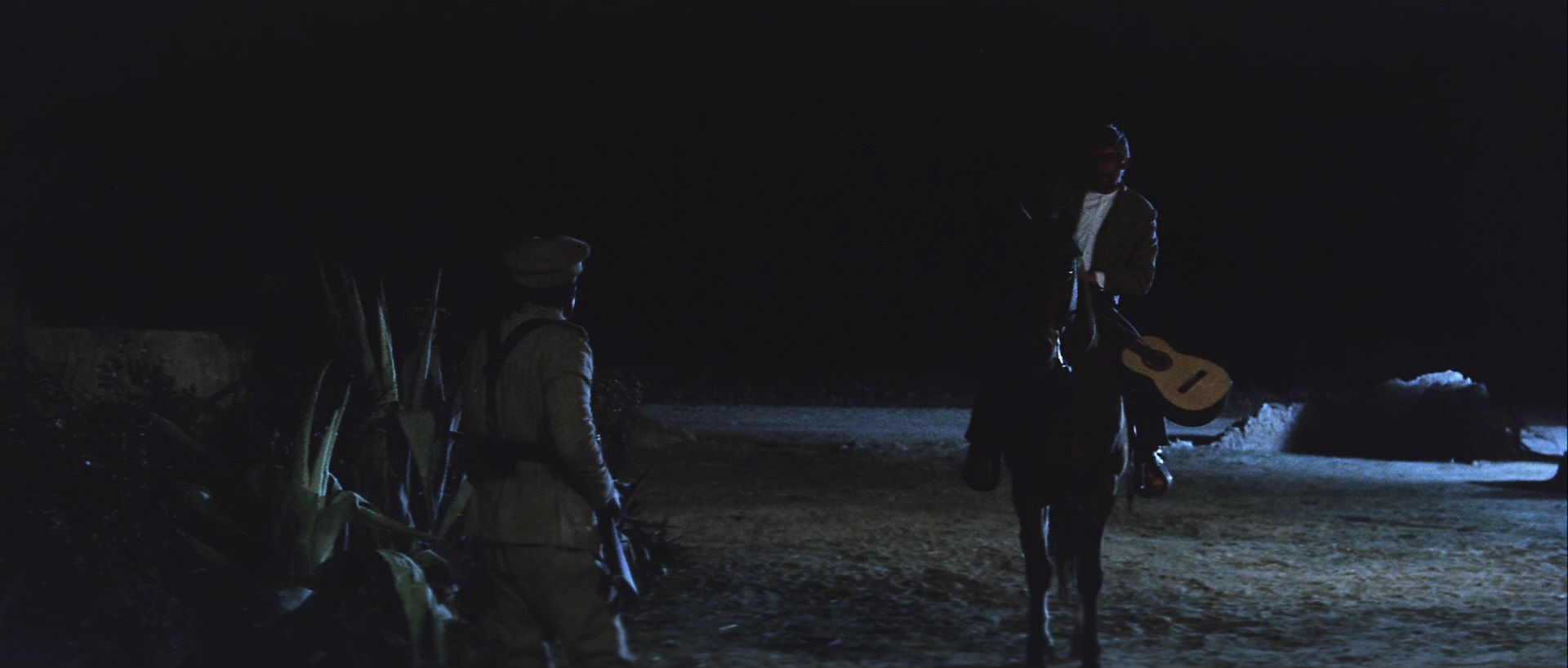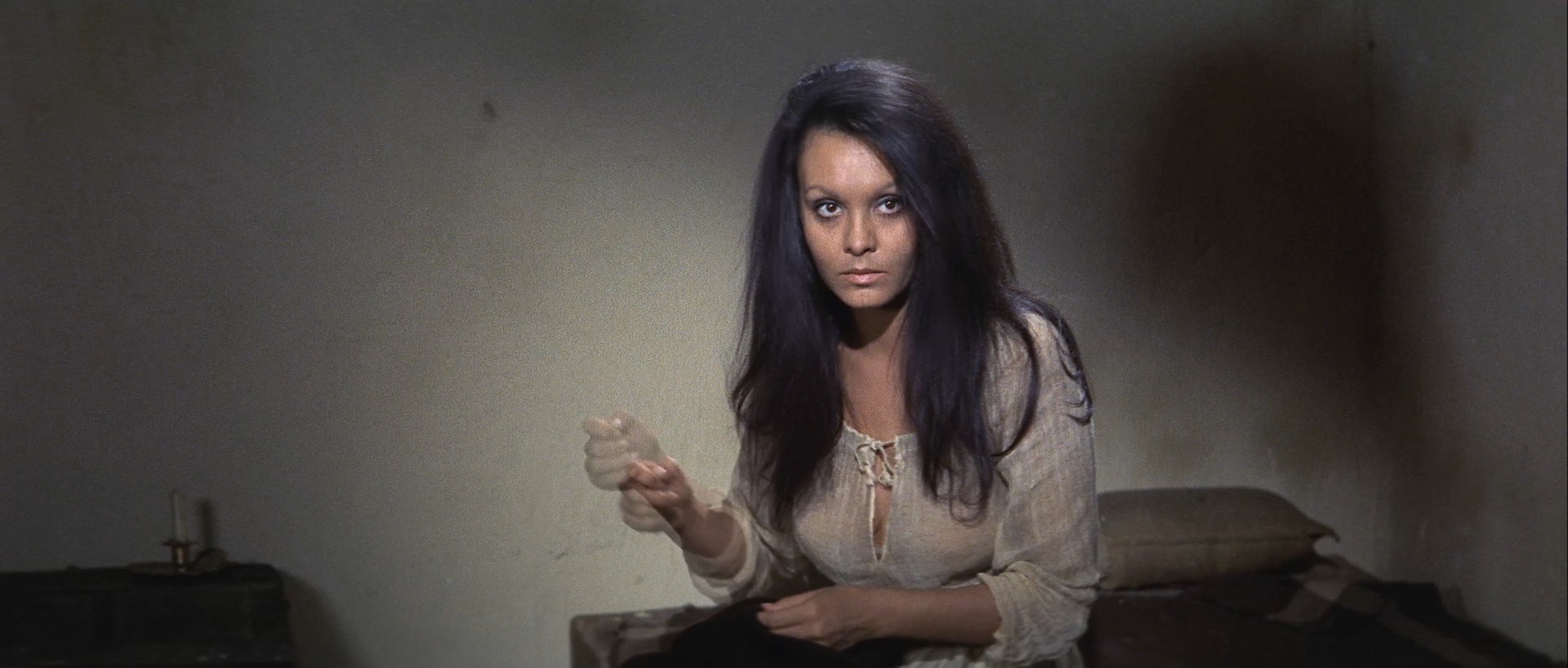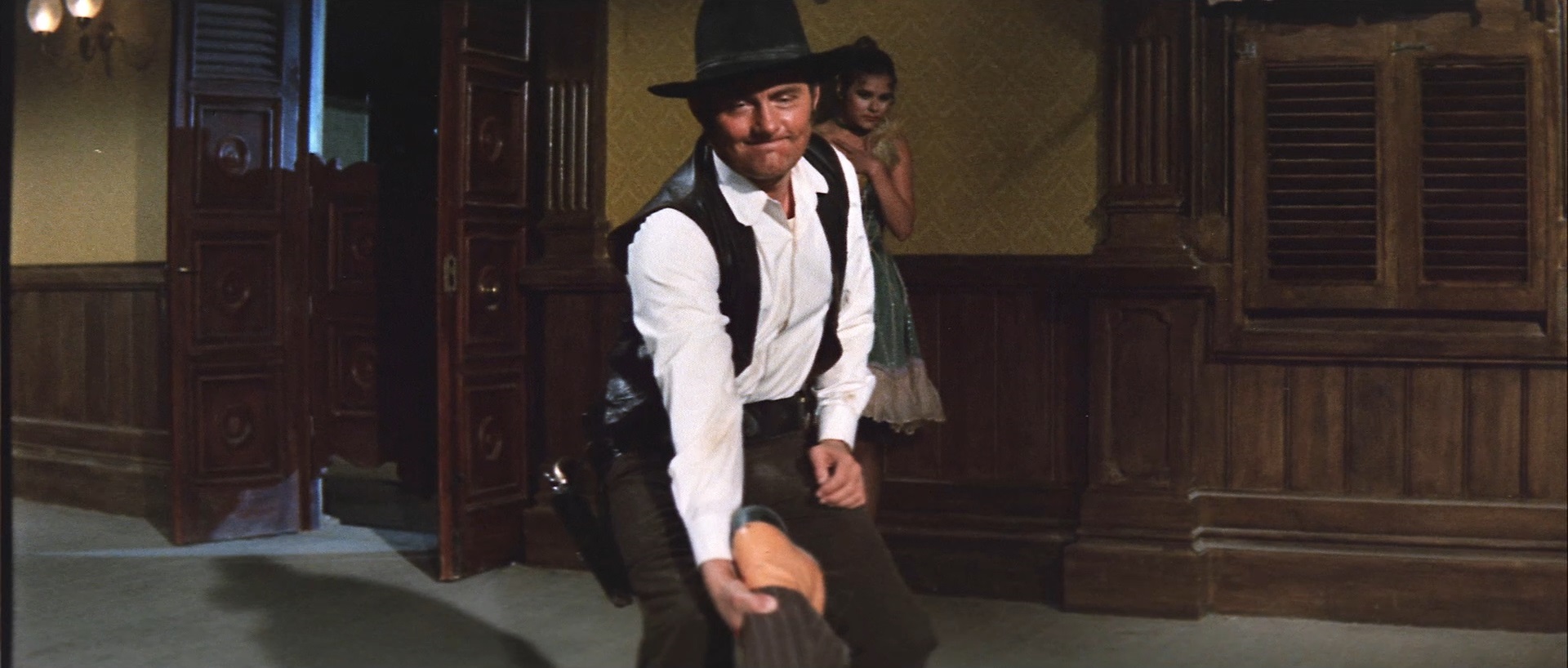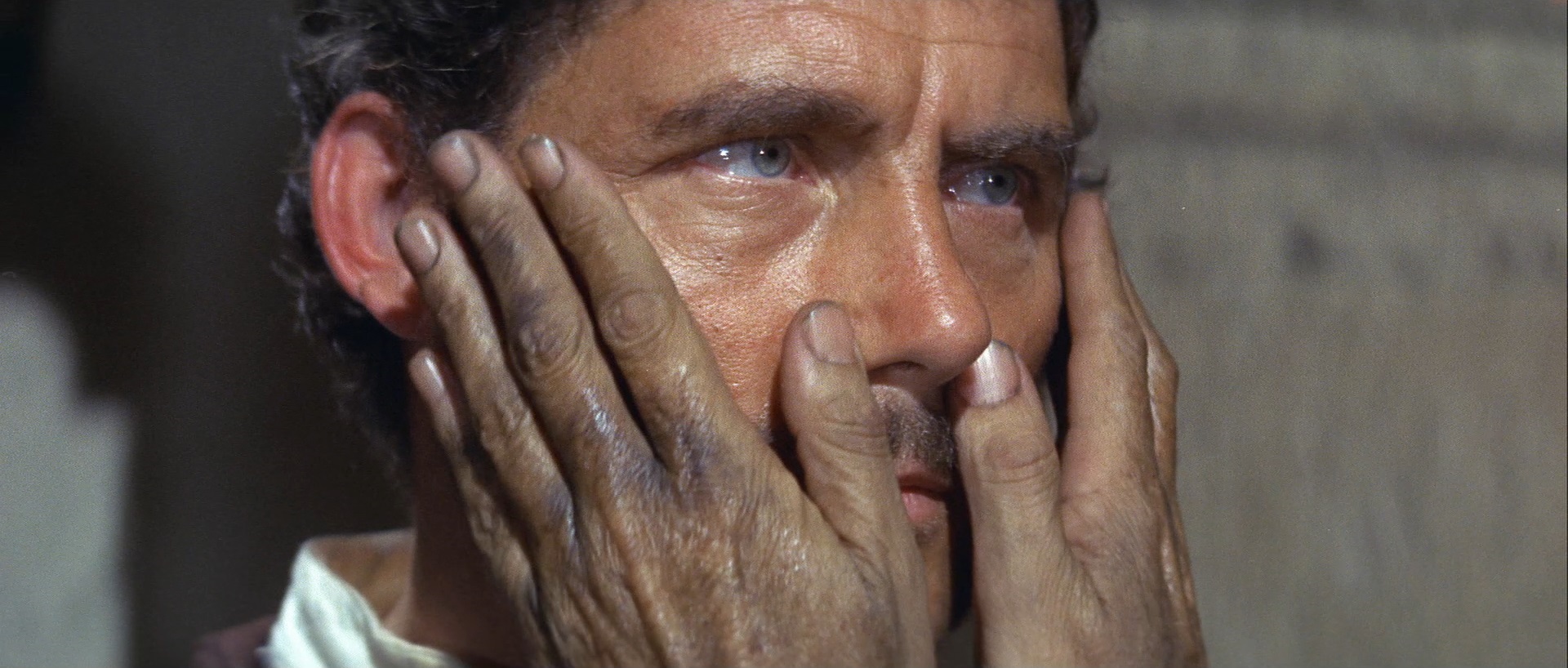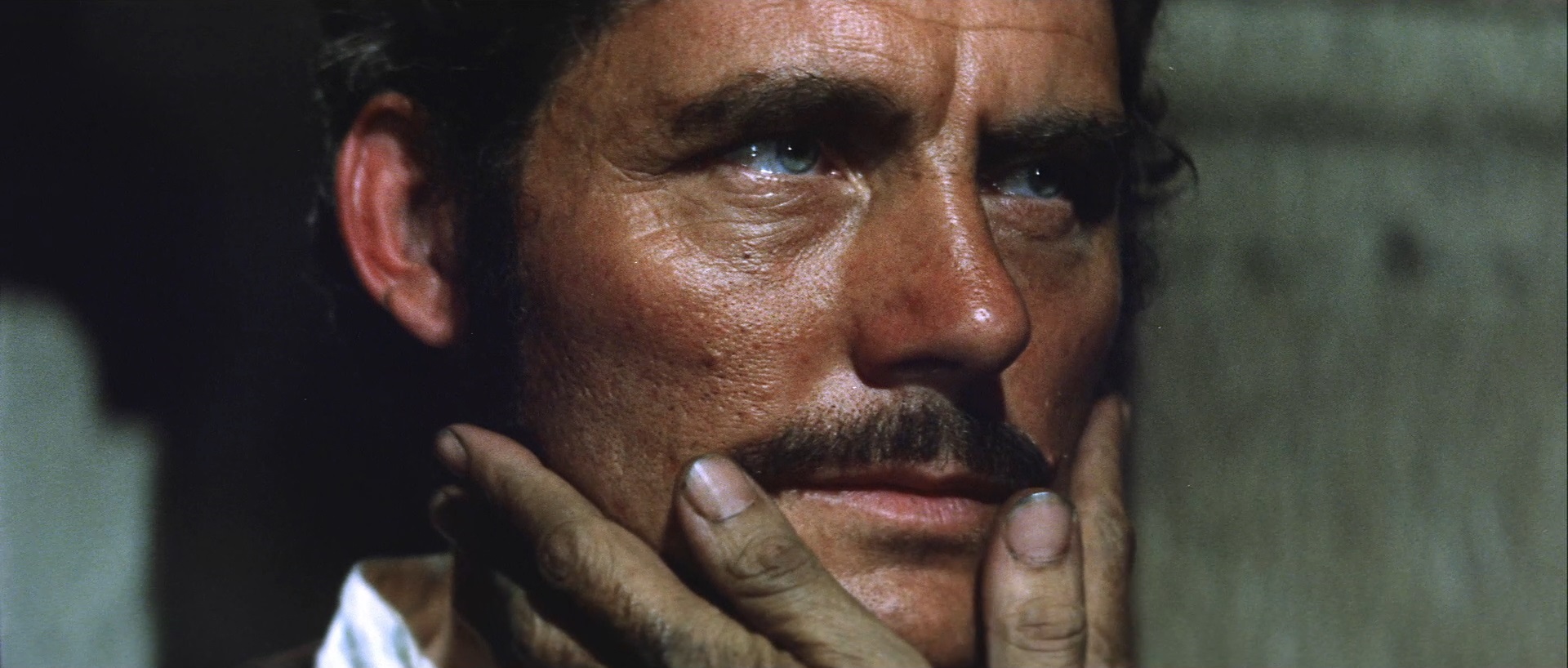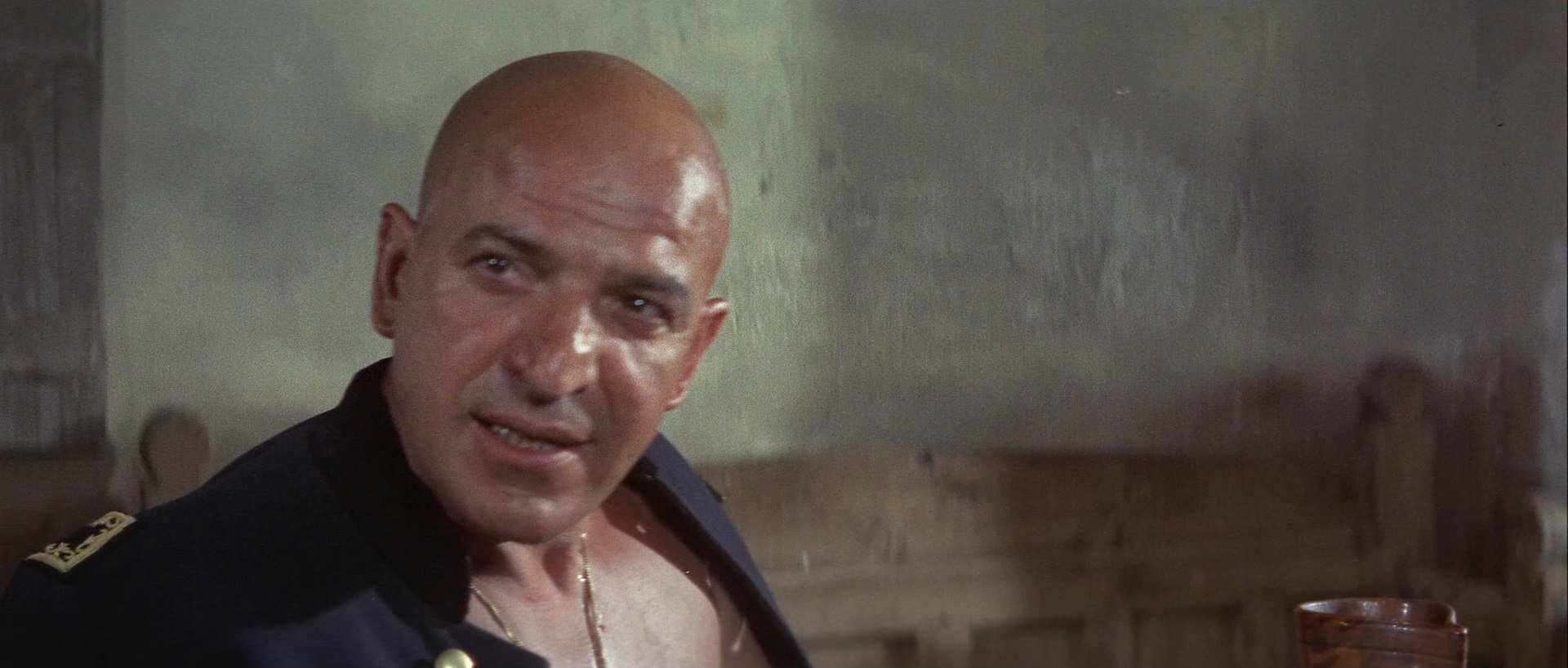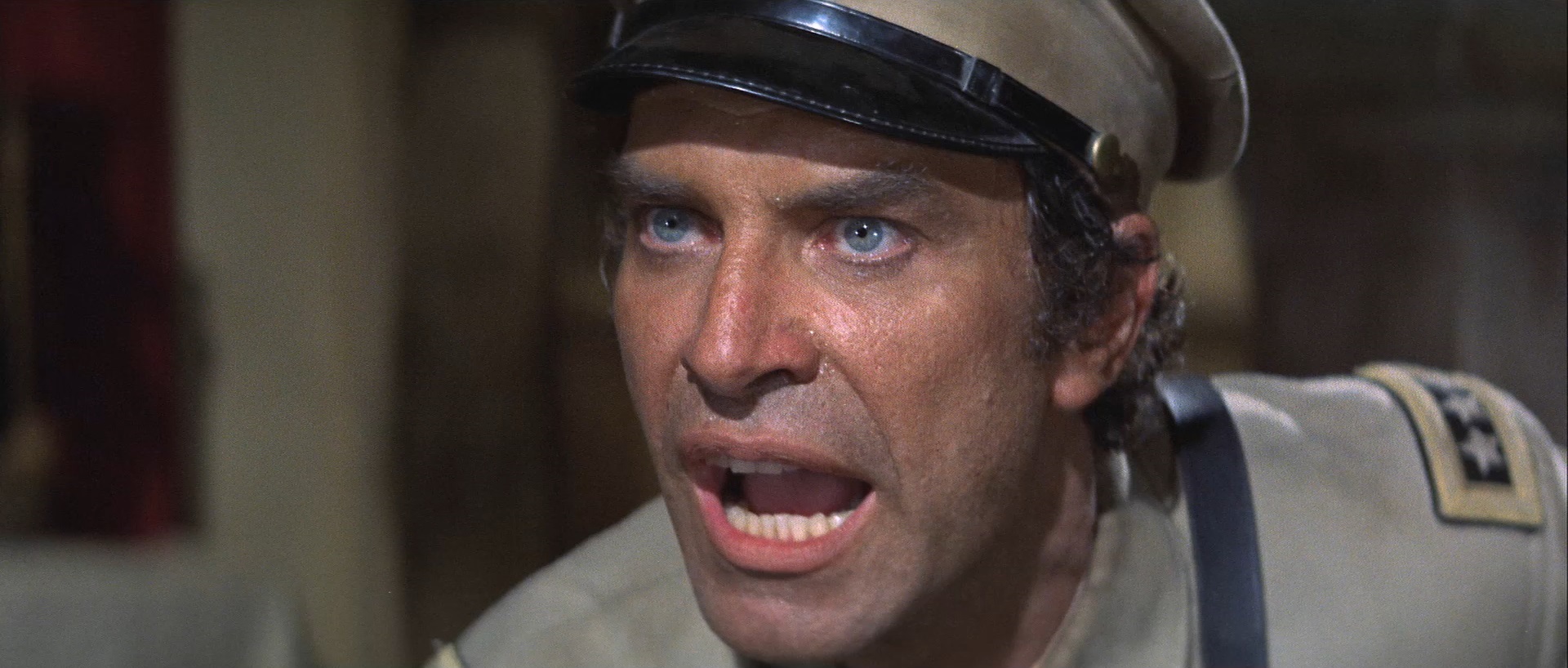| Reviews & Columns |
|
Reviews DVD TV on DVD Blu-ray 4K UHD International DVDs In Theaters Reviews by Studio Video Games Features Collector Series DVDs Easter Egg Database Interviews DVD Talk Radio Feature Articles Columns Anime Talk DVD Savant Horror DVDs The M.O.D. Squad Art House HD Talk Silent DVD
|
DVD Talk Forum |
|
|
| Resources |
|
DVD Price Search Customer Service #'s RCE Info Links |
|
Columns
|
|
|
Town Called Hell, A
Kino // R // August 18, 2015
List Price: $22.95 [Buy now and save at Amazon]
Spaghetti westerns have been making their way to Blu-ray in dribs and drabs, with rarely more than a handful rearing their heads in any given year. This August, however, Kino Lorber Studio Classics is unleashing a torrent of Eurowesterns in high definition, chief among them Face to Face as it makes its long-awaited worldwide premiere on Blu-ray. If there's one outlier in this wave, it's A Town Called Hell (known in less timid markets as A Town Called Bastard). This 1971 film bears many of the hallmarks of a Spaghetti western: its title, obviously, its international cast and crew, its brutally violent premise, and even the fact that it was lensed entirely in Spain. On the other hand, director Robert R. Parrish -- perhaps best known for that other Casino Royale -- is decidedly British, and there's nary an Italian name to be found in its end credits.
However determined you may be to classify A Town Called Hell one way or the other, its horrific opening sequence would certainly not be out of place in a Spaghetti western, as a band of rebels slaughter soldiers and innocents alike in a small Mexican church. Much has changed in the intervening years, however. One of the men leading that massacre (Robert Shaw) has since assumed the role of priest in this flea-bitten speck of a town. Another (Martin Landau) has sold out his ideals, finding it more profitable to play instead for the winning team. This bastardly town seems to hold a great many answers; not only has Landau's Colonel arrived in search of the shadowy Aguila -- the enigmatic leader of the rebellion -- but a grieving widow (Stella Stevens) finds herself drawn into its web as she posts a bounty for her husband's killer.
A Town Called Hell has a reputation as being incomprehensible. I thought that I wouldn't take it that far, but damned if I'm not finding it brutal to hammer out any sort of coherent synopsis. I haven't even mentioned the savage warlord played by Telly Savalas. I didn't touch on the fact that the widowed Avila arrives in town in a coffin, awoken by a couple of words spoken by a companion we're quickly told afterwards is a deaf mute who doesn't utter a syllable for the remainder of the film. Then...well, there's this:
A Town Called Hell finds questions far more alluring than answers, lobbing three balls in the air for every one that's caught. The motivations propelling these characters are defined but not in any particularly compelling way. The storytelling is sloppy enough that A Town Called Hell screeches to a halt in the third act to make way for an eighteen minute flashback to reveal a secret that might as well have been spelled out in forty foot tall neon letters only to backpedal slightly with a "maybe, but maybe not". A Town Called Hell is such a grueling test of endurance that I couldn't care enough to decide. Robert Shaw is generally the standout of any movie he's in, but he's generally content to glower and mutter incoherently here. Martin Landau contributes a more incendiary performance, not that it accomplishes anything. Stella Stevens is limp, lifeless dead air, which I suppose makes sense for a character introduced in a coffin and who is dreamt of as a ghost. Telly Savalas relishes his role as a loudmouthed warlord, although it's generally pointless and shortlived besides. Though there are many astonishingly dark moments -- such the Colonel systematically slaughtering the entire town, four at a time, until Aguila is unveiled -- A Town Called Hell generally settles for some uninvolving combination of accusations, screaming, betrayals, and shooting. The wildly uneven pacing and muddled storytelling make this kinda/sorta Spaghetti western almost impossible to recommend. The curious or completist might find A Town Called Hell worth a rental, but you're better off putting your money towards anything else in Kino Lorber's wave of Eurowesterns instead.
Video
Nearly everything about A Town Called Hell is off-kilter, and that absolutely extends to its presentation on Blu-ray.
For one, the image doesn't showcase film grain so much as video noise. In a way, this isn't unusual; the Spaghetti westerns remastered by LVR Video & Post in Italy for other labels are swarming with analog noise from their outmoded flying-point CRT scanner. The strange thing is that in those releases, the noise floats over the image, lending a false sense of crispness and clarity while the film proper is actually rather fuzzy and indistinct. That's not at all the case with A Town Called Hell, which genuinely is sharp and nicely detailed. That it's noise rather than grain is more apparent in motion, but still, I've never seen anything quite like this:
At times, the video noise is so pronounced that it looks as if I'm peering through a screen door. The AVC encode struggles at times with the persistent veil of noise as well, making it that much more uncomfortable to watch. Authoring woes further extend to night skies that suffer from heavy posterization:
A Town Called Hell also suffers from a number of skipped frames as well as this bout of ghosting:
The third act of the film is defined by a nearly twenty minute flashback, and contrast and density take a dramatically different turn once we're offered that interminable look into the priest's past. Nothing about the screenshot below looks well-balanced and filmic to my eyes:
At the same time, this doesn't appear to be a deliberate visual choice meant to distinguish between the past and present, and contrast does not return to normal afterwards. The images below bookend the flashback but were presumably filmed as part of the same shot, and the remainder of the film continues on in much the same way:
Hell, I haven't even touched on flaws that date back to the original production, such as its occasional disinterest in remaining in focus:
On the other hand, it is kind of thrilling to see anamorphic lens distortion in a Eurowestern, as so many of these films were shot spherically in Techniscope. I get my kicks where I can.
I'm honestly kind of fascinated by all of this. Literally thousands of Blu-ray discs have passed through my hands over the past eight years, and I've never come across one that looks quite like A Town Called Hell. The presentation gets so much right -- its gorgeous colors and rich detail, particularly -- that I honestly can't decide if the good outweighs the bad.
A Town Called Hell stakes its claim on a single-layer Blu-ray disc, and the film is presented at its theatrical aspect ratio of 2.35:1.
Audio
As this is a British production rather than a traditional Spaghetti western, it follows that A Town Called Hell's only audio option is an English DTS-HD Master Audio soundtrack (16-bit; 2-ch mono). Unfortunately, the presentation is as challenging aurally as it is visually.
A Town Called Hell is plagued by a persistent hiss, which, in and of itself, isn't necessarily a problem. The difficulty is that a massive amount of the dialogue throughout the film -- it's especially an issue with Robert Shaw's line readings -- is whispered or muttered. Even played at a significantly higher volume than normal, entire conversations remain unintelligible. The heavy background noise is nearly as loud as much of the dialogue, so fiddling with the volume only accomplishes so much. If English subtitles had been available, I would've been forced to use them, but...well... Other sequences, meanwhile, are better balanced and wholly discernable, even if the frequencies predictably refuse to budge from the mid-ranges. It's genuinely bizarre.
Extras
Nothing, unless you're feeling generous enough to count a standard definition trailer for an entirely different movie.
The Final Word
It's up for debate whether or not A Town Called Hell ought to be considered a Spaghetti western. Less arguable is whether or not the movie's worth watching. As tempted as I am to suggest skipping a frequently unlistenable misfire like this altogether, I'll round up and say Rent It instead.
However determined you may be to classify A Town Called Hell one way or the other, its horrific opening sequence would certainly not be out of place in a Spaghetti western, as a band of rebels slaughter soldiers and innocents alike in a small Mexican church. Much has changed in the intervening years, however. One of the men leading that massacre (Robert Shaw) has since assumed the role of priest in this flea-bitten speck of a town. Another (Martin Landau) has sold out his ideals, finding it more profitable to play instead for the winning team. This bastardly town seems to hold a great many answers; not only has Landau's Colonel arrived in search of the shadowy Aguila -- the enigmatic leader of the rebellion -- but a grieving widow (Stella Stevens) finds herself drawn into its web as she posts a bounty for her husband's killer.
A Town Called Hell has a reputation as being incomprehensible. I thought that I wouldn't take it that far, but damned if I'm not finding it brutal to hammer out any sort of coherent synopsis. I haven't even mentioned the savage warlord played by Telly Savalas. I didn't touch on the fact that the widowed Avila arrives in town in a coffin, awoken by a couple of words spoken by a companion we're quickly told afterwards is a deaf mute who doesn't utter a syllable for the remainder of the film. Then...well, there's this:
A Town Called Hell finds questions far more alluring than answers, lobbing three balls in the air for every one that's caught. The motivations propelling these characters are defined but not in any particularly compelling way. The storytelling is sloppy enough that A Town Called Hell screeches to a halt in the third act to make way for an eighteen minute flashback to reveal a secret that might as well have been spelled out in forty foot tall neon letters only to backpedal slightly with a "maybe, but maybe not". A Town Called Hell is such a grueling test of endurance that I couldn't care enough to decide. Robert Shaw is generally the standout of any movie he's in, but he's generally content to glower and mutter incoherently here. Martin Landau contributes a more incendiary performance, not that it accomplishes anything. Stella Stevens is limp, lifeless dead air, which I suppose makes sense for a character introduced in a coffin and who is dreamt of as a ghost. Telly Savalas relishes his role as a loudmouthed warlord, although it's generally pointless and shortlived besides. Though there are many astonishingly dark moments -- such the Colonel systematically slaughtering the entire town, four at a time, until Aguila is unveiled -- A Town Called Hell generally settles for some uninvolving combination of accusations, screaming, betrayals, and shooting. The wildly uneven pacing and muddled storytelling make this kinda/sorta Spaghetti western almost impossible to recommend. The curious or completist might find A Town Called Hell worth a rental, but you're better off putting your money towards anything else in Kino Lorber's wave of Eurowesterns instead.
Video
Nearly everything about A Town Called Hell is off-kilter, and that absolutely extends to its presentation on Blu-ray.
For one, the image doesn't showcase film grain so much as video noise. In a way, this isn't unusual; the Spaghetti westerns remastered by LVR Video & Post in Italy for other labels are swarming with analog noise from their outmoded flying-point CRT scanner. The strange thing is that in those releases, the noise floats over the image, lending a false sense of crispness and clarity while the film proper is actually rather fuzzy and indistinct. That's not at all the case with A Town Called Hell, which genuinely is sharp and nicely detailed. That it's noise rather than grain is more apparent in motion, but still, I've never seen anything quite like this:
At times, the video noise is so pronounced that it looks as if I'm peering through a screen door. The AVC encode struggles at times with the persistent veil of noise as well, making it that much more uncomfortable to watch. Authoring woes further extend to night skies that suffer from heavy posterization:
A Town Called Hell also suffers from a number of skipped frames as well as this bout of ghosting:
The third act of the film is defined by a nearly twenty minute flashback, and contrast and density take a dramatically different turn once we're offered that interminable look into the priest's past. Nothing about the screenshot below looks well-balanced and filmic to my eyes:
At the same time, this doesn't appear to be a deliberate visual choice meant to distinguish between the past and present, and contrast does not return to normal afterwards. The images below bookend the flashback but were presumably filmed as part of the same shot, and the remainder of the film continues on in much the same way:
Hell, I haven't even touched on flaws that date back to the original production, such as its occasional disinterest in remaining in focus:
On the other hand, it is kind of thrilling to see anamorphic lens distortion in a Eurowestern, as so many of these films were shot spherically in Techniscope. I get my kicks where I can.
I'm honestly kind of fascinated by all of this. Literally thousands of Blu-ray discs have passed through my hands over the past eight years, and I've never come across one that looks quite like A Town Called Hell. The presentation gets so much right -- its gorgeous colors and rich detail, particularly -- that I honestly can't decide if the good outweighs the bad.
A Town Called Hell stakes its claim on a single-layer Blu-ray disc, and the film is presented at its theatrical aspect ratio of 2.35:1.
Audio
As this is a British production rather than a traditional Spaghetti western, it follows that A Town Called Hell's only audio option is an English DTS-HD Master Audio soundtrack (16-bit; 2-ch mono). Unfortunately, the presentation is as challenging aurally as it is visually.
A Town Called Hell is plagued by a persistent hiss, which, in and of itself, isn't necessarily a problem. The difficulty is that a massive amount of the dialogue throughout the film -- it's especially an issue with Robert Shaw's line readings -- is whispered or muttered. Even played at a significantly higher volume than normal, entire conversations remain unintelligible. The heavy background noise is nearly as loud as much of the dialogue, so fiddling with the volume only accomplishes so much. If English subtitles had been available, I would've been forced to use them, but...well... Other sequences, meanwhile, are better balanced and wholly discernable, even if the frequencies predictably refuse to budge from the mid-ranges. It's genuinely bizarre.
Extras
Nothing, unless you're feeling generous enough to count a standard definition trailer for an entirely different movie.
The Final Word
It's up for debate whether or not A Town Called Hell ought to be considered a Spaghetti western. Less arguable is whether or not the movie's worth watching. As tempted as I am to suggest skipping a frequently unlistenable misfire like this altogether, I'll round up and say Rent It instead.
|
| Popular Reviews |
| Sponsored Links |
|
|
| Sponsored Links |
|
|
| Release List | Reviews | Shop | Newsletter | Forum | DVD Giveaways | Blu-Ray | Advertise |
|
Copyright 2024 DVDTalk.com All Rights Reserved. Legal Info, Privacy Policy, Terms of Use,
Manage Preferences,
Your Privacy Choices | |||||||









